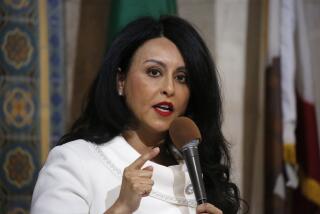At ease with sleaze
- Share via
ALTHOUGH HE IS yoked to President Bush in their common Iraq policy and lame-duck status, British Prime Minister Tony Blair has more in common with former President Clinton. The litany of likenesses includes a belief in a “third way” between old-style liberalism and the free market, a fluency in public that critics dismiss as glibness, a wife who was a successful lawyer, a willingness to accept the hospitality of show-business celebrities and, finally, a reputation for running an ethically challenged administration.
It’s this last, and lowest, common denominator with Clinton that has lately bedeviled Blair. Last month, he was questioned by police about allegations that his Labor Party nominated supporters for seats in the House of Lords and other plum positions in exchange for campaign loans. The Scotsman newspaper put it this way: “As Tony Blair approached his tenth anniversary in office, his ambition was to secure a place in history. And he’s certainly done that by being the first serving prime minister to be interviewed in a criminal investigation whilst in office.”
Americans cannot expect to be rewarded for their public or political service with ermine-lined capes or the right to call yourself “Sir.” In fact, the Constitution says that “no title of nobility shall be granted by the United States.” So Clinton couldn’t dispense knighthoods to friends and political allies, but he gave some of them something better: their freedom. As the clock was ticking on his presidency in 2001, Clinton announced several ill-advised pardons, including one of fugitive financier Marc Rich, whose ex-wife gave an estimated $450,000 to the Clinton Presidential Library Fund.
Blair’s current troubles, like Clinton’s in 2001, may be intensified by his past indiscretions. The “honors” scandal isn’t exactly the first time Blair’s government has been accused of wallowing in sleaze. As early as 1997, the government came under fire for providing an exemption from a ban on tobacco advertising for a race-car organization that had donated $1.7 million to the Labor Party. In the years since, leading figures in the Blair Cabinet have found themselves in financial or sexual scrapes. Just last month, Blair, citing national security, ordered his attorney general to drop an investigation into whether a British defense firm had paid bribes to Saudi officials in the 1980s.
Political psychologists can argue about why two farsighted politicians allowed their substantial legacies to be sullied by sleaze. Maybe the answer is as simple as power inevitably corrupting. Whatever the explanation, like his friend Bill, Tony may leave office with people talking not about his vision but about his blind spots.
More to Read
Sign up for Essential California
The most important California stories and recommendations in your inbox every morning.
You may occasionally receive promotional content from the Los Angeles Times.









